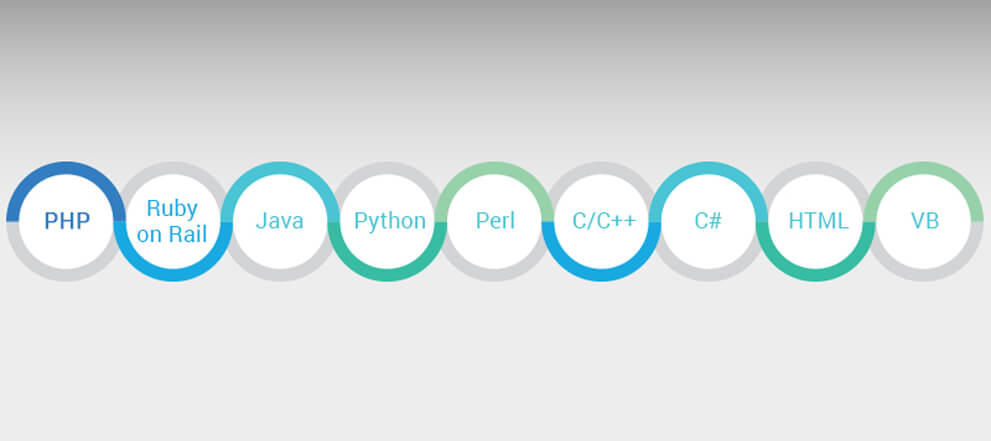Best Web Development Languages to Learn
Table of Contents

- jaro education
- 7, February 2024
- 10:00 am
In the world of web development, different programming languages, like JavaScript, HTML, CSS, and PHP, each play a vital role. It’s not just about coding; it’s about creating websites and applications that work well and look good. Whether you’re a beginner or an experienced developer, understanding these languages is key to making your online projects successful. This blog gives you an introduction to web programming languages, helping you choose the right ones to enhance the functionality and appearance of your web creations.
Basics of Web Programming
The skill of creating digital experiences with web-specific programming languages is known as web programming. These languages let programmers talk to computers and make dynamic, interactive apps and web pages. Languages like HTML, JavaScript, and Python are important in web programming. With the help of these tools, a web programmer may create instructions that produce web content and promote user interaction.
Selecting the Best Programming Language for Web Development
Choosing the right programming language for web development is a crucial decision that can significantly impact the success of your projects. To make an informed choice, there are five essential questions to consider.
1. Ease of Mastery
Learning a new web development language demands an investment of time and resources. Therefore, it’s important to evaluate which languages offer a quicker path to proficiency. Some languages are notably easier to learn than others, making them excellent choices for beginners. Among the most approachable languages are HTML, Python, JavaScript, PHP, and Java. Building a solid foundation in these simpler languages can pave the way for tackling more challenging ones in the future.
2. Demand in the Industry
The web development landscape is dynamic, and the demand for specific programming languages evolves over time. To stay relevant as a developer, it’s essential to focus on languages likely to remain in high demand. According to Google rankings and industry trends, languages such as Java, Python, JavaScript, C++, C#, PHP, and Perl are expected to maintain their relevance in the coming years. By mastering these languages, you can position yourself as a sought-after web developer.
3. Language Maintainability
When choosing a programming language, it’s vital to consider its maintainability. An effective language should have a well-established ecosystem of libraries and vendor support. Then, evaluate the latest releases of the language or technology stack to ensure that your application will remain up-to-date for an extended period. This is particularly crucial when planning for long-term client engagement, as you may need to hand over the codebase to another team. The ease of maintenance and the long-term viability of your application should be key considerations in your decision-making process.
4. Scalability and Performance
The choice of programming language has a significant impact on your application’s performance. This consideration becomes especially crucial when there is limited room for scaling within the development environment. Assess how many users your program should support and consider the potential growth in user numbers. Will an increasing user base impact your application’s performance? Is your application equipped to handle additional features without compromising functionality? Addressing these questions will help you determine the scalability and performance of your chosen language.
5. Project Complexity
The size and complexity of your project play a pivotal role in determining the most suitable programming language. For smaller and simpler applications, such as marketing websites or web forms, content management systems like WordPress may suffice, requiring minimal programming. In contrast, complex projects like e-commerce websites, enterprise applications, and those leveraging emerging technologies such as IoT devices and AI demand more robust languages like Java or C#. Experienced technical managers can develop expertise in estimating project complexity, allowing them to make well-informed language selections.
Types of Web Development Languages
Web development languages serve as the foundation of the internet, enabling programmers to realise their visions. The main web development languages are examined in this review, along with how they have shaped the everyday internet experiences.

*kcsitglobal.com
JavaScript
JavaScript is a versatile and dynamic programming language that plays a fundamental role in web development. It is used as a client-side language in nearly all websites, making it an essential skill for web developers and allows you to add interactivity to web pages, and enable features like form validation, dynamic content updates, and user-friendly interfaces. Also, it has expanded beyond the browser and is now used in server-side development through technologies like Node.js. This language’s popularity and widespread use make it a must-learn for web developers.
Python
Python is renowned for its readability and ease of use, making it an excellent choice for beginners. It is an open-source language with a strong community and extensive libraries, making it suitable for a wide range of applications. Python’s versatility extends to web development, where frameworks like Django and Flask are commonly used for building web applications. Python excels in data science, machine learning, and scientific computing, further expanding its utility.
Go (Golang)
Developed by Google, Go, often referred to as Golang, is gaining popularity for its simplicity and efficiency. It is well-suited for building high-performance applications, making it a good choice for web development. Go is known for its support in handling multicore and networked systems, making it ideal for scalable web services. Several major companies, including Google, Uber, and Dropbox, use Go for various projects, making it an attractive language to learn for web development.
Java
Java is a language used across various domains, including web development. Its platform independence, thanks to the “Write Once, Run Anywhere” principle, makes it a staple for building cross-platform web applications. Java is also widely utilised for Android app development. With a massive developer community and a wealth of libraries and frameworks, Java remains a sought-after language in the web development field.
PHP
This language has been a milestone of web development for decades, powering over 80% of websites on the internet. It is a server-side scripting language designed for web development. PHP is relatively easy to learn, making it accessible for beginners. It is commonly used for web applications that require server-side processing, dynamic content generation, and database connectivity. Although it has faced criticism for security issues, PHP remains a prevalent language in web development.
Swift
Swift is Apple’s language of choice for developing iOS and macOS applications. It is an open-source, easy-to-learn language that focuses on performance and safety. Swift’s syntax is designed to be more human-friendly and concise, making it a go-to language for iOS developers. Its use extends to web development for creating web applications that work seamlessly with Apple devices. Swift is valued for its clean syntax, which reduces the amount of code required to achieve specific functionality.
C and C++
C and C++ are foundational languages that serve as the building blocks for many other languages. While they are not often the first choice for web development, they are essential in low-level systems programming, game development, and embedded systems. They offer high performance and precise control over hardware, making them valuable in specific domains.
Matlab
It is a programming language tailored for scientific and computational applications, making it a valuable tool for researchers and engineers. It excels in data analysis, algorithm development, and complex simulations. While not the primary choice for web development, it finds applications in scenarios where extensive data processing and algorithm development are required.
TypeScript
TypeScript is an increasingly popular language known for enhancing JavaScript with static typing and improved tooling support. It is particularly valuable for large-scale web applications, as it helps catch errors during development and facilitates code maintenance. TypeScript is gaining traction in the web development community, and its adoption is on the rise.
Scala
Scala is a general-purpose language that combines object-oriented and functional programming features. It is well-suited for developing scalable and high-performance applications. Scala finds its use in web development, especially for data engineering, distributed computing, and big data processing. Its power lies in its ability to handle complex, data-intensive tasks.
SQL
Structured Query Language/SQL is the standard language for managing and querying relational databases. While it is not a primary programming language, it is essential for web developers who work with databases to store and retrieve data efficiently. SQL is indispensable for creating, modifying, and querying databases, and it is a fundamental skill for back-end developers.
HTML and CSS
HTML (HyperText Markup Language) and CSS (Cascading Style Sheets) are the core technologies for building web pages. HTML provides the structure and content of web pages, while CSS defines their appearance and layout. These languages are foundational for web development, and proficiency in HTML and CSS is essential for creating visually appealing and functional web applications.
NoSQL
NoSQL databases are a category of non-relational databases designed for high performance and scalability. While not a programming language, understanding NoSQL databases is crucial for web developers who work with data storage and retrieval. NoSQL databases offer flexibility and scalability, making them valuable for applications that require handling large volumes of data and rapid growth.
Rust
Rust is a systems programming language known for its focus on safety, concurrency, and performance. While it may not be a primary choice for web development, Rust’s ability to prevent memory-related errors and provide excellent performance makes it appealing for specific web applications. It is a language of choice for projects that demand both high performance and security.
Perl
Perl, often known as the “Swiss Army knife” of programming languages, is a versatile language suitable for web development, system administration, and network programming. Its unique syntax and features make it valuable for specific use cases. Perl’s concise syntax and extensive library support contribute to its ongoing relevance in the web development landscape.
Conclusion
The world of web development languages is rich with options, offering a spectrum of possibilities. From the foundational HTML and CSS to the dynamic capabilities of JavaScript, and PHP, each language contributes to online experiences. As you start your web development journey, consider this exploration as a guiding compass.
To further polish your skills in coding using various programming languages, opt for the Manipal University Jaipur’s well-known Master Of Computer Applications (MCA) Online Degree Programme. For anyone looking to advance their knowledge of complex system analysis and design in the ever-changing IT industry, this course is perfect. Comprehensive instruction in web programming languages, cloud computing, practical labs, tests, and a culminating project are all included. Enroll now to improve your knowledge of web development.








